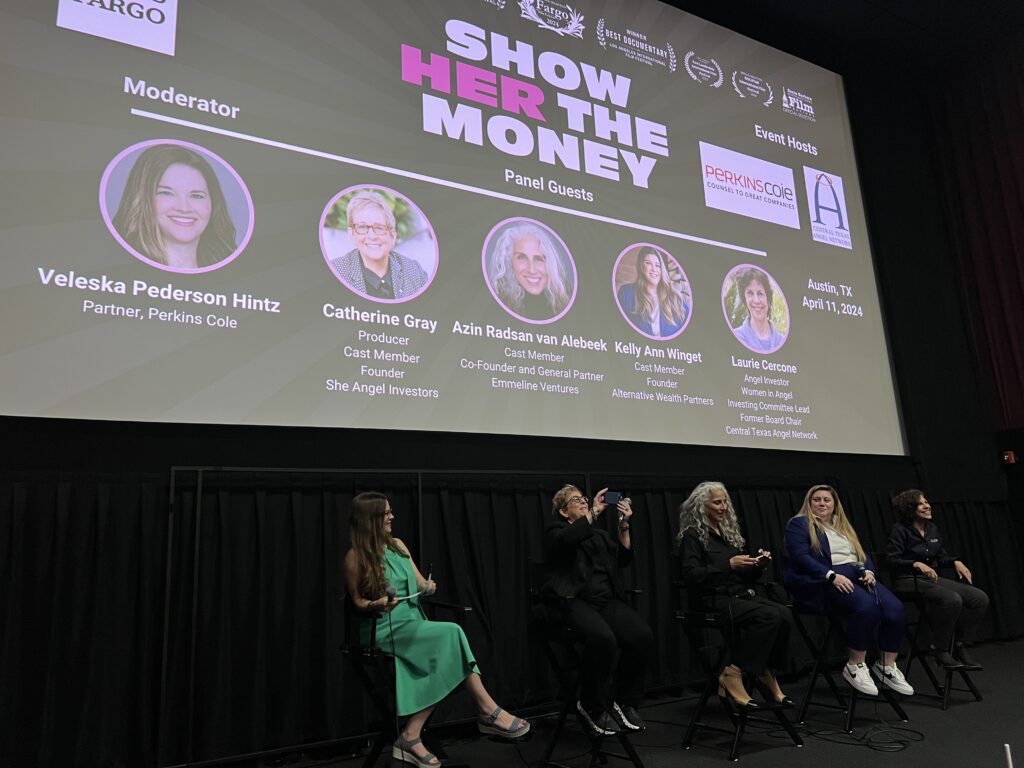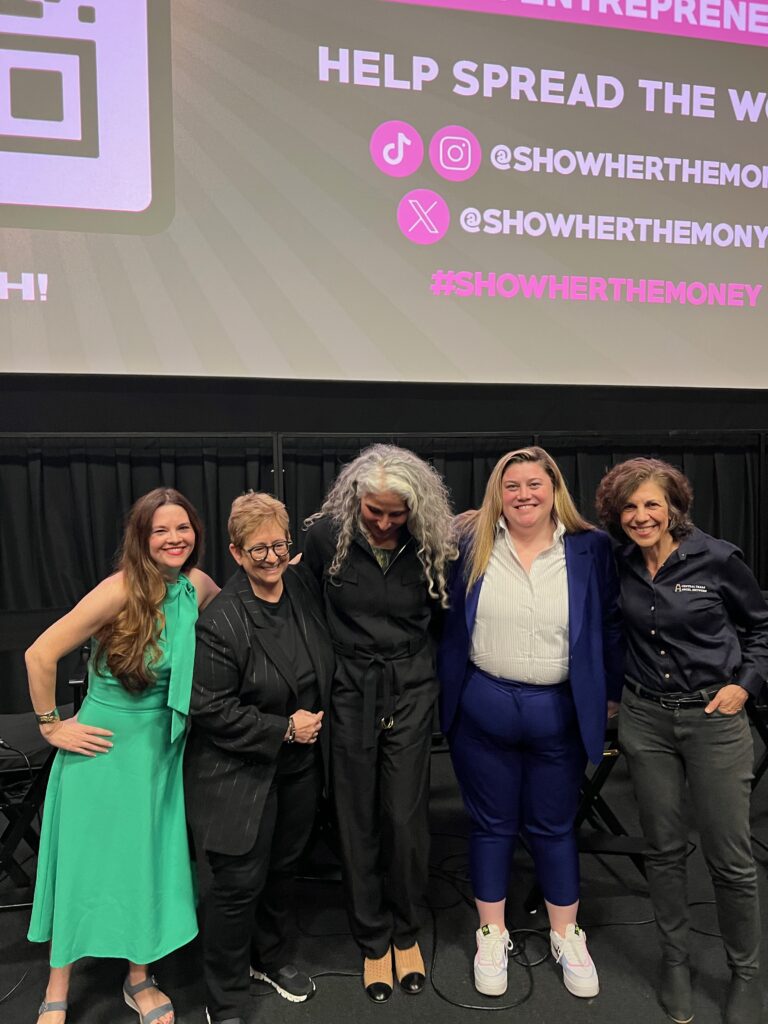
Female founders need more money to finance their ventures – that’s the key takeaway from the documentary “Show Her the Money.”
Over 100 people turned out Thursday night at Alamo Drafthouse on South Lamar in Austin to watch the film, highlighting female founders, their quest for Venture Capital, and the lack of investment dollars going to women.
When the documentary’s producer, Catherine Gray, discovered that female founders receive only 2 percent of Venture Capital, she asked, “Why are we only getting 2 percent, and what is Venture Capital?” Gray said during a panel discussion following the film’s showing. Valeska Pederson Hintz, partner at Perkins Coie, moderated the panel and asked Gray why she created the film.
“I’m a big believer that film and television help change culture like awareness creates change, and I thought, wow, I’m in this ecosystem with these amazing, smart women in venture and angel investing,” Gray said.
“Show Her the Money” generates awareness and provides education on Venture Capital, Gray said. It also seeks to inspire more women to learn about and participate in Venture Capital and angel investing. The film does this in a storytelling way that makes it feel tangible and hšeartfelt, she said. Venture Capital is “very exciting, and who doesn’t want to have their pulse on the innovations out there?” Gray said. Also, the VC asset class could be more lucrative than any other investment, she said.
The movie is on a 50-city grassroots global tour sponsored by Wells Fargo across the U.S., Canada, Europe, and New Zealand. Locally, Perkins Coie and the Central Texas Angel Network, CTAN, sponsored the showing.
In addition to Gray, the other panelists included Laurie Cercone, an angel investor with CTAN, Kelly Ann Winget, founder of Alternative Wealth Partners, and Azin Radsan van Alebeek, co-founder and general partner of Emmeline Ventures.
The film emphasizes the need for women to get involved in the Venture Capital industry.
“I was typically the only woman in the room,” Winget said. She is also featured in the film as an angel investor in Dapper Boi. Winget has been involved in the private equity investment space for a long time. She believes it’s crucial to let women know these investment opportunities exist and educate them on how to get involved.
Sara Brand, co-founder of True Wealth Ventures, the country’s first female-focused venture capital fund, attended the film’s showing. Brand founded True Wealth Ventures with Kerry Rupp. True Wealth Ventures has raised a $20 million fund and a $35 million fund targeted at female founders in consumer sustainability and health.
Only 18 percent of general partners in Venture Capital firms are women, said Radsan van Alebeek, co-founder and general partner of Emmeline Ventures.
Among the cast members featured in the film is entrepreneur Dawn Lafreeda from San Antonio. She is the largest single-owner franchisee within Denny’s restaurant chain and one of the most successful female restaurant franchise owners in the U.S. She is also self-made and started as a waitress and hostess at Denny’s. Now, she’s an angel investor and limited partner in SoGal Ventures, which invests in women. The founder of that venture fund, Pocket Sun, is also featured in the film.
Entrepreneurs showcased in the film include Vicky Pasche, founder of Dapper Boi, a gender-neutral, body-inclusive apparel line; Diipa Bulle-Khosla, founder of Inde Wild, a skincare products line targeted at South Asian women; Marian Leitner, founder of Archer Roose Wine, which sells luxury wines in cans; and Jasmine Jones, founder of Myya, an online post-mastectomy intimates brand.
CTAN, with more than 120 members, is one of Texas’s oldest active angel investment groups, and women make up 28 percent of its membership, said Cercone, CTAN angel investor. CTAN has a sidecar fund for female investors who want to write smaller checks. It is a $20,000 investment and gets put into between eight and ten companies, Cercone said. CTAN focuses on life sciences, software, hardware, and consumer packaged goods. CTAN is actively recruiting more accredited female investors with industry experience.
“If we get more women and people who understand the industries dominated by women, it’s going to result in more female-founded companies getting funded,” Cercone said.
It’s not about charity, said Radsan van Alebeek, co-founder and general partner of Emmeline Ventures. She said investing in women can be lucrative and yield a significant return on investment.
Pederson Hintz said the movie stated that a $10,000 check invested in a female-founded company goes much further than the same investment with a male founder. The data shows female founders generated 78 cents from every dollar of funding, compared to 31 cents for male-founded startups, she said.
Radsan van Alebeek said women are more capital-efficient because they know it will be challenging to get more funding.
“Whatever funding she gets, she cherishes, she nurtures; she has to be very thoughtful about how it’s going to be used,” she said.
“We’re kind of constantly in survival mode and thinking about 30 different problems,” Winget said. “We live in a world where we’re second-guessed by our male peers constantly,’’
Winget encouraged the allies of female founders to brag about the women in their lives to their networks and to promote their work.
“Women are very quiet about their accomplishments and skills,” she said. I think the louder we get about supporting women, the better.”
Radsan van Alebeek also said women must shift their mindsets and not wait for an intimate invitation to do something.
“If you want to do something, go do it,” she said.
Gray said she wants to see more women and men invest in women, LGBTQ founders, and other overlooked people with innovative ideas.
“Every person, including Caucasian men, should care about us creating enough funding for women and BI-POC and LGBTQ founders to get funding,” she said. That’s so that all their unique innovations can come to life and do everything from “curing cancer to saving the environment.”
That’s why there is such a great need for diversity in funding, Gray said. “That’s where the power is,” she said. “People deciding who gets the funding tend to invest in people they identify with, so you have to see yourself sitting at that table of deciding who gets the money.”
The panelists advised female founders to focus on aligning with investors who understand their industry and the specific challenges women face.
“Don’t take the first check you get, or do some due diligence on both the personality and the background of your potential investor because taking bad money can be detrimental to your business,” Winget said.
The founder might work with the investor for a decade, so it’s important to have investors aligned with the business.
Pederson Hintz also referenced a Harvard Business Review study that showed that there is a bias in investor questions when female founders pitch their ventures. Female entrepreneurs are often asked about risks and mitigation, whereas male entrepreneurs are asked about potential gains.
“I’ve been in all male-dominated spaces, even in the private equity space. I’ll go into a room, and I have a male assistant, and they’ll ask him a question before they ask me,” Winget said. “I can’t work with a person like that. So, you have to have a little bit of grounding, walk away from situations like that, and call them out on it because they don’t really know that they’re doing it, unfortunately.”
Other panelists advised female founders to ignore the question and keep talking about the investment opportunities.
“This is literally all made-up like everyone woke up one day and decided I’m going to do this,” Radsan van Alebeek, co-founder and general partner of Emmeline Ventures, said. “Everything is made up, so once you internalize that energy, you are unstoppable because if you can think it and dream it, it can happen.”
The panelists urged everyone to increase women’s participation in venture capital, educate themselves about the investment landscape, and invest in women-led initiatives. They also emphasized the need to improve financial literacy from a young age. Lastly, there is a push for collective action to support and invest in diverse, underrepresented groups.

